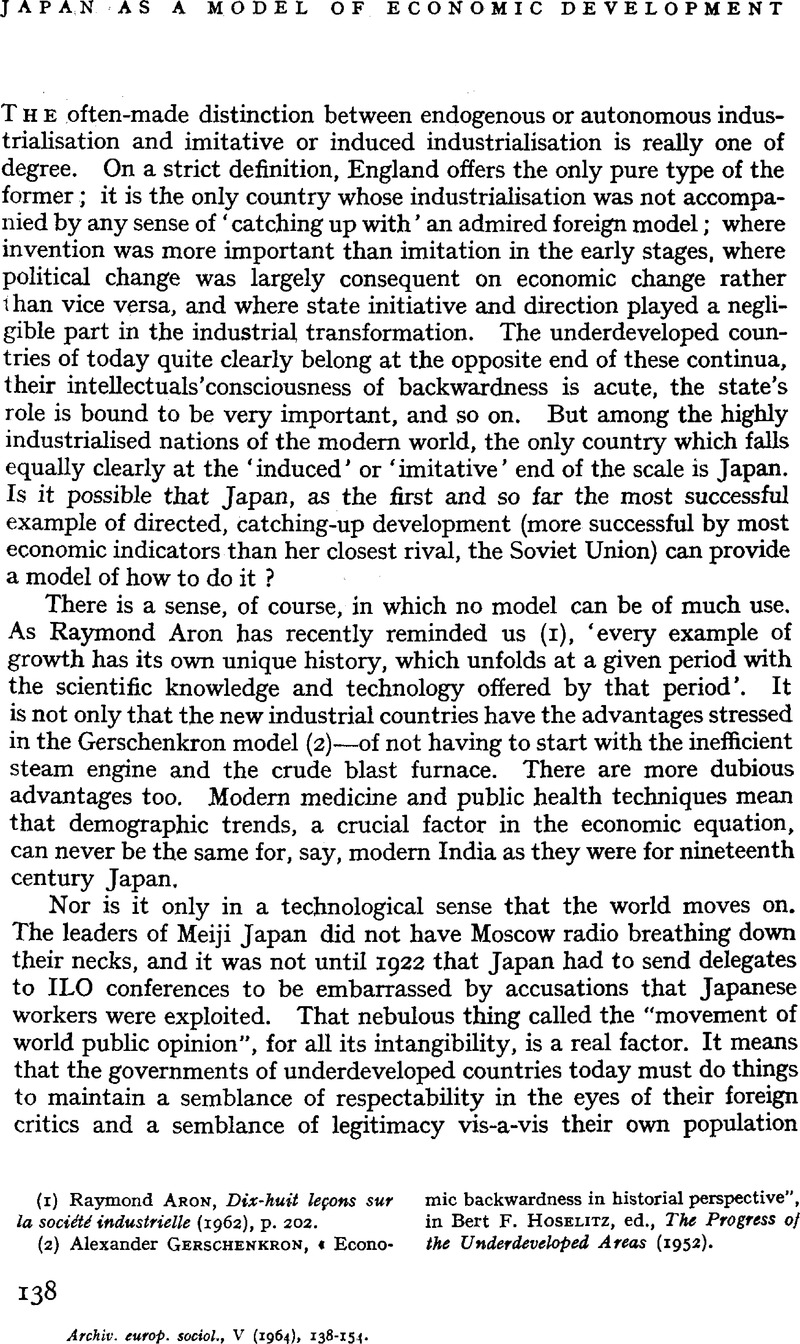No CrossRef data available.
Article contents
Japan as a Model of Economic Development
Published online by Cambridge University Press: 28 July 2009
Abstract

- Type
- Notes Critiques
- Information
- European Journal of Sociology / Archives Européennes de Sociologie , Volume 5 , Issue 1 , June 1964 , pp. 138 - 154
- Copyright
- Copyright © Archives Européenes de Sociology 1964
References
(1) Aron, Raymond, Dix-huit leçons sur la société industrielle (1962), p. 202.Google Scholar
(2) Gerschenkron, Alexander, « Economic backwardness in historial perspective”Google Scholar, in Hoselitz, Bert F., ed., The Progress of the Underdeveloped Areas (1952).Google Scholar
(3) For a recent discussion of these features, see Rosovsky, H., Capital Formation in Japan (1961)Google Scholar, chapter iv, and Crawcour, E. S., “Japan's economy on the eve of modernisation”Google Scholar, an unpublished paper to appear in a volume on Japanese economic development edited by W. W. Lockwood and published by the University of Princeton Press.
(4) See the concluding chapters of Lockwood, W. W., The Economic Development of Japan (1954)Google Scholar, and for an excellent brief analysis comparing Japan to other examples of industrialisation, Rosovsky. loc. cit.
(5) Rostow, W. W., The Stages of Economic Growth (1961), p. 34.Google Scholar
(6) Beasley, W. G. and Blacker, Carmen, “Japanese historical writing in the Tokugawa period”Google Scholar, in Beasley, W. G. and Pulleyblank, E. G., eds., Historians of China and Japan (1961).Google Scholar
(7) See Lockwood, W. W., “Japan's response to the West: the contrast with China”, World Politics, IX (1956).Google Scholar
(8) Sansom, G. B., in The Western World and Japan (1951)Google Scholar, gives an excellent account of the initial impact.
(9) Rosovsky, H., “The indigenous components in the modern Japanese economy”, Economic Development and Cultural Change, IX (1961), p. 495.Google Scholar
(10) For this rescript see Benedict, E., The Chrysanthemum and the Sword (New York 1946), p. 211.Google Scholar
(11) For these aspects of Japanese nationalism, see Holtom, D. C., Modern Japan and Shinto Nationalism, rev. ed. (1947)Google Scholar, and Brown, D. M., Nationalism in Japan (1955).Google Scholar
(12) An idea of the content of this course may be gained from Hall, R. K., Shushin, the ethics of a defeated nation (1949).Google Scholar
(13) For an example of the Japanese doctrine on the subject, see Hozumi, N., Ancestor Worship and the Japanese Law, 4th rev. ed. (1948).Google Scholar
(14) Choosing at random the May 1963 index for the Mainichi newspaper, one finds no fewer than 61 references to the Olympic Games. They are eventually due to take place in October 1964.
(15) For example, a translation of the pamphlet published by the staff of the London Economist, Consider Japan, has enjoyed very wide sales in Japan.
(16) Capital Formation in Japan, esp. ch. 11 and p. 88.Google Scholar
(17) Economist [London], op., cit. (1963).Google Scholar
(18) Rostow, W. W., op. cit. pp. 29–31, 112–121.Google Scholar
(19) Ranis, G., “The community-centred entrepreneur in Japanese development”, Explorations in Entrepreneurial History, VIIIGoogle Scholar and Hirschmeier, J., “Shibusawa and modern business enterprise”Google Scholar, unpublished paper to appear in a volume on Japanese economic development to be edited by W. W. Lockwood and published by Princeton University Press.
(20) Professor Maruyama quotes the following passage from a turn-of-the century novel, Sôseki's, “Since Then”. It is a conversation between a young man and his sister-in-law.
And what did Father find to scold you about today?
That's hardly the point. He always finds something. What really did surprise me, though, was to hear that Father has been serving the nation, He told me that from the age of eighteen until today he has never ceased serving the country to the best of his ability.
I suppose that s why he's made such a success.
Yes, if one can make as much money as Father has by serving the nation. I wouldn't mind serving it myself.
This kind of irony was, however, a scarce commodity in pre-war Japan. Maruyama comments that the Father here portrayed “can be regarded as the typical Japanese capitalist […] it was precisely when the success motive joined with nationalism that modern Japan was able to embark on its ‘rush towards progress’.” Maruyama, Masao, Thought and Behaviour in Modern Japanese Politics (1963), p. 7.Google Scholar
(21) Abegglen, J. C., The Japanese Factory, 1958.Google Scholar
(22) Th. Veblen, , “The opportunity of Japan”Google Scholar, reprinted in Essays in Our Changing Order (1934).Google Scholar




